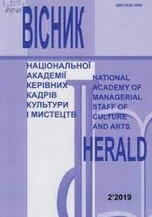МИСТЕЦЬКІ ПРОЄКТИ ІНТЕГРАТИВНОГО ТИПУ: ДОСЛІДНИЦЬКИЙ І ВИКОНАВСЬКИЙ АСПЕКТИ
ARTISTIC PROJECTS OF INTEGRATIVE TYPE: RESEARCH AND PERFORMANCE ASPECTS
Author(s): Iryna Hrynchuk, Halyna Misko, Natalia OvodSubject(s): Cultural history, Music, 19th Century, ICT Information and Communications Technologies, Distance learning / e-learning, Pedagogy
Published by: Національна академія керівних кадрів культури і мистецтв
Keywords: musical art of Ukraine of the XIX century; modern art education; art projects; Vladyslav Zaremba;
Summary/Abstract: The purpose of the article is to consider the possibilities of using new educational technologies in distance and blended learning, in particular the creation of integrative art projects as in the case of representaing the creative personality of Vladyslav Zaremba as a Ukrainian composer of Polish origin. The research methodology consists in the use of historical-comparative and personalistic approaches, as well as the activity approach from the point of view of art pedagogy. The results of the experimental work prove that the involvement of technology of integrative art projects allows highlighting various aspects of the creative personality of Vladyslav Zaremba as a Ukrainian composer, music teacher, the author of the “Taras Shevchenko's Kobzar” collection, as well as samples of chamber vocal and instrumental music. Scientific novelty. Attention is focused on the role of Ukrainian composers of Polish origin, associated with Volyn and Podillia, in the development of professional Ukrainian music in the mid-nineteenth – early twentieth century. Among them: Joseph Dominik Vytvytsky (1813–1866), Michael (Michael) Zavadsky (1828–1887) and Vladyslav Zaremba (1833–1902). Different facets of Vladyslav Zaremba's creative personality have been traced, which are presented by separate scopes of student search and executive activities in the preparation and presentation of integrative art projects. In particular, the following areas have been presented: artistic Ukrainian–Polish relations in the context of the contribution of Ukrainian composers of Polish origin to the composers of the Dolysenko period; presentation of V. Zaremba's creative career; vocal and choral work of the composer; Shevchenko in the works of V. Zaremba (“Taras Shevchenko’s Kobzar” collection, Kyiv, 1889), the program book of the event dedicated to the 185th anniversary of V. Zaremba (vocal class of associate professor N. Ovod), the “Let’s Sing Together” project realised in collaboration with the Youth Choir (artistic director H. Misko) and Polish students. The composer's piano works have also been singled out, which include a piano cycle for children “Mały Paderewsky” (“Little Paderewsky”), translations of Ukrainian folk songs, plays “Farewell to Ukraine”, “Thought-Shumka”, “The Dnipro Roars and Moans”, “At the end of the dam willows rustle”, “All the burlaks gathered”, and a number of piano miniatures. A brief performing and pedagogical analysis of V. Zaremba's work “Oh, the moon, the moon” has been performed. Conclusions. The authors have generalised the role of the technological process of integrative art projects for intensification of searching and performing activities of music students, their analysis of certain aspects of Ukrainian-Polish cultural relations, the role of individuals in the development of musical culture of Ukraine.
Journal: Вісник Національної академії керівних кадрів культури і мистецтв
- Issue Year: 2022
- Issue No: 3
- Page Range: 190-195
- Page Count: 6
- Language: Ukrainian

